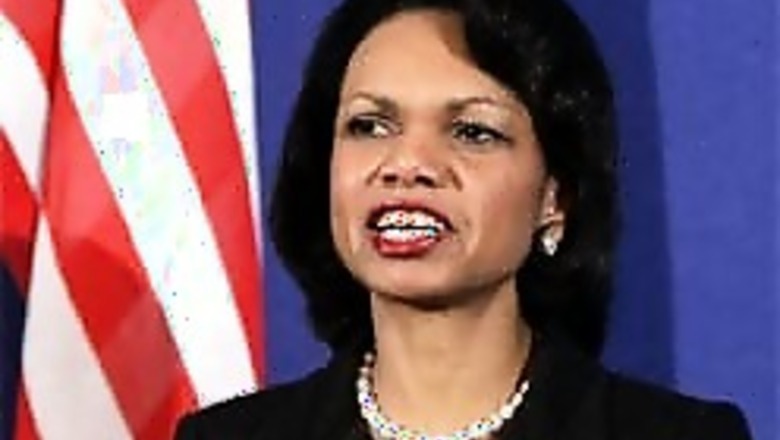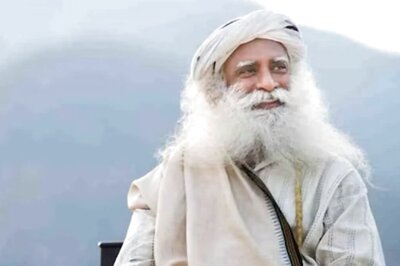
views
Athens,(Greece): US Secretary of State Condoleezza Rice on Tuesday called Iran's position on nuclear development self-defeating and argued that recent statements further Tehran's "isolation from the international community."
"We have no argument with the Iranian people," Rice said. "They deserve better than they are currently seeing from their government because the actions of their government are isolating Iran further and further."
The remarks, made at a joint news conference with Greek Foreign Minister Dora Bakoyannis in Athens, come as Iran's chief nuclear negotiator delivered tough rhetoric on the nuclear program.
The Iranian official, Ali Larijani, said Tuesday that his country would cut off ties with the International Atomic Energy Agency if the U.N. Security Council imposes US-favored sanctions. The IAEA, the UN's nuclear watchdog, has supervised Tehran's nuclear activities.
Iran maintains its nuclear research and advances are aimed at a peaceful energy program. The United States and other countries fear the work is a guise to hide development of a nuclear weapon.
The Security Council has set a Friday deadline for the suspension of Iran's nuclear program, asking IAEA chief Mohamed ElBaradei to report back by then.
If Tehran suspends its cooperation with the IAEA, it would effectively be dropping out of the Nuclear Nonproliferation Treaty.
"Threatening the international community that you'll walk out of treaty negotiations, that you'll throw the IAEA out because the world demands that you demonstrate that your nuclear programs are peaceful, and not on the way to a nuclear weapon, is very emblematic of the kind of Iranian behavior that we've seen over the last couple of years," Rice said.
"Given Iran's past behavior," Rice said that "no one is prepared" to allow the country to acquire "the technologies that could lead to a nuclear weapon" under the guise of developing a civil nuclear program.
Asked whether she was seeking U.S. access to Greek military bases for possible action against Iran, Rice said she did not raise such a proposal.
"The United States of America understands and believes that Iran is not Iraq ...," Rice said. "We are on a diplomatic course."
President Bush has said the United States is pursuing diplomacy but that all options are on the table, including military action.
The Associated Press reported that Greece, a temporary and nonvoting member of the Security Council, said it believes diplomacy is key to resolving the situation.
"We believe there must be coordination within the European Union, and decisions will be taken within the framework of the Security Council," Bakoyannis said, according to the AP. "We are in the middle of a diplomatic effort, which still has tools at its disposal that allow it to be effective."
Weighing in from China on Tuesday, Russian Defense Minister Sergei Ivanov said a political solution is the only acceptable answer to the controversy surrounding Iran's nuclear program, Russia's Interfax news agency reported.
"During talks with my Chinese counterpart and friend Cao Gangchuan, we discussed the problem of the Iranian nuclear dossier," Ivanov said. "Russia and China [voting members of the Security Council] share almost identical positions on the issue.
"Both Russia and China stand for political and diplomatic measures. We see no alternative to negotiations."
Speaking at a conference on the nuclear energy program, Larijani said Iran would continue its efforts in secret if attacked.
Larijani's warning came a day after Iranian President Mahmoud Ahmadinejad said he thought it unlikely the Security Council would impose sanctions against Iran, adding he believes most member countries "are rational enough not to make such a great mistake."
"We don't have any need to cover up our activities," Ahmadinejad insisted Monday. "If we were going to cover up, we would have conducted ourselves differently."
Asked about the possibility of a U.S. attack, Ahmadinejad said he did not believe such military action would take place, but he warned, "My nation is a strong nation. It can defend itself."
U.S. intelligence officials have estimated, based on the assumption that Iran has only P-1 centrifuges, that the country is five to 10 years away from making a nuclear weapon.
Ahmadinejad also recently asserted that Iran is "now under the process of research and testing" of faster P-2 centrifuges, which enrich uranium more quickly. It's unclear if he was saying Iran already has P-2 centrifuges.



















Comments
0 comment